Body Of Missing Cleric Found In Iran, Amid Wave Of Attacks On Clergy
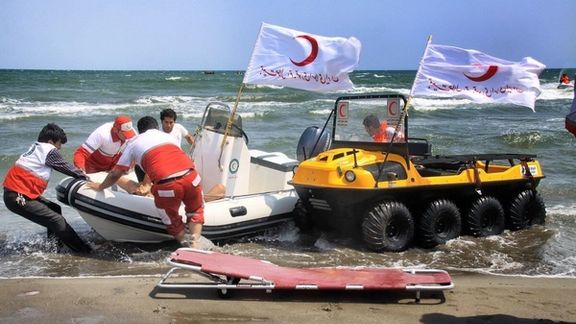
The body of a missing cleric has been found in northern Iran.

The body of a missing cleric has been found in northern Iran.
Ebrahim Fazel had gone missing on Tuesday as he had traveled from the religious city of Qom – where he was studying at the seminary – to his hometown in the northern province. His body was found from the coastal waters near the city of Jouybar
Hailing from a well-known family, he was the son of the founder of Mazandaran province’s Islamic seminary Mohammad Fazel and the grandson of one the late prominent Shia clerics in Iran,Ayatollah Mohammad Kouhestani. He was also the brother-in-law of hardliner lawmaker Mahmoud Nabavian.
Circumstances around the death remain unclear, evidence unable to determine if his body was thrown into water or he drowned.
An official of the province’s governor’s office claimed he was last seen while shopping for a swimming suit. However, he may be covering up the fact that members of clergy have increasingly become targets of attacks by Iranians who see them as symbolizing the nation’s problems.
Late in April, media close to the Revolutionary Guard reported that two clerics were targeted by a driver in the religious city of Qom after another similar attack a few days earlier. It was the third attack on clerics within a few days. Tehran police announced on April 27 that a manhunt was underway to find another driver in the attempted murder of a cleric in the capital.
Since the 1979 revolution, the clergy have gained increasing power, but discontent has risen in recent years, particularly amid waves of protests over economic, political, and civil rights issues.
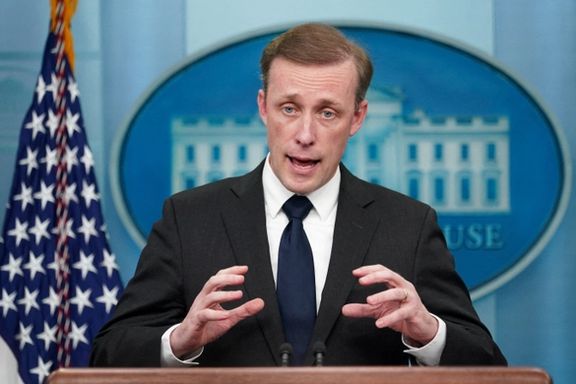
As US National Security Advisor Jake Sullivan Thursday announced his visit to Saudi Arabia, he reiterated that Washington will not allow Iran to obtain nuclear weapons.
Sullivan, speaking at the Washington Institute for Near East Policy, said he would be traveling to Saudi Arabia on Saturday for talks with Saudi leaders. A source told Reuters Sullivan is expected to meet with Saudi Crown Prince Mohammed bin Salman.
Sullivan repeated the administration’s position that the United States will "take the necessary action to ensure that Iran does not acquire a nuclear weapon," but still seeks a diplomatic outcome to the challenge posed by Tehran.
“But we have made clear to Iran that it can never be permitted to obtain a nuclear weapon. As President Biden has repeatedly reaffirmed, he will take the actions that are necessary to stand by this statement, including by recognizing Israel’s freedom of action,” Sullivan told the gathering of Middle East experts at the institute.
Sullivan mentioned that a new nuclear deal with Iran should see all the enriched uranium “whether it’s five bombs or whatever it may be of 60 percent—that that also goes by the board.”
However, the question of how to deter Iran from destabilizing the region remained largely unclear, except fostering integration between allies and pursuing reduction of tensions, alluding to the agreement between Tehran and Riyadh to restore diplomatic relations.
However, after the Chinese-brokered deal in March, Iran openly called for attacks against Israel by its Palestinian and other groups largely dependent on Tehran’s support. A series of terror attacks inside of Israel led to a military flare-up and days of rocket attacks by Palestinians from Gaza and Lebanon.
Iran, calling these attacks a great achievement, has been urging more strikes by its proxy forces.
In recent days the Revolutionary Guard has also seized two oil tankers in the Persian Gulf waters, while the US maintains a strong naval presence in the area.

Speaking about the administration’s policy in the region, Sullivan highlighted the strategy of an “interconnected Middle East” empowering US allies and partners, which would reduce “the resource demands on the United States”.
“So we’re actively building an integrated air and maritime defense architecture in the region. This is something that’s been talked about for a long time, but it’s now happening through innovative partnerships and through technology,” he said.
Robert Satloff, the executive director of the Washington Institute asked Sullivan about how the United States can deter Iran from further expanding its nuclear program, as administration officials have admitted that Iran can be a few weeks from having enough enriched uranium to build a bomb.
Sullivan responded by highlighting military cooperation with “our partners—including working very closely with Israel,” and holding joint military drills, and recognizing Israel’s right to act.
He added that “we are going to continue to take action to, yes, deter Iran from getting a nuclear weapon, and then to seek a diplomatic solution that puts this on a long-term pathway of stability.”
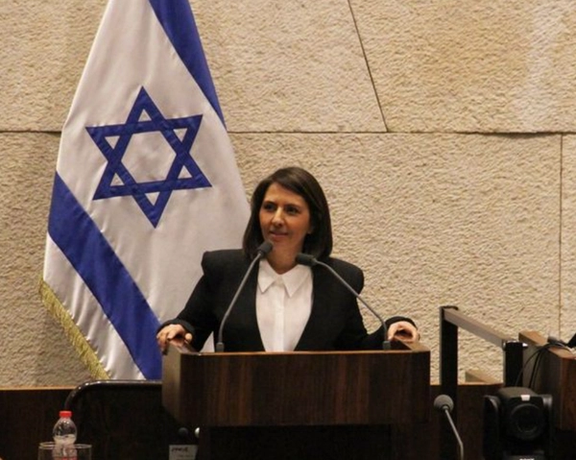
Israel’s intelligence minister has told Iran International that the letter by Israeli MPs to advocate for the separation of Iran’s Azarbaijan region was a ‘misunderstanding’.
Gila Gamliel told our correspondent that the MPs rescinded their signatories following clarification about the content of their letter backtracking on the original claims.
"After I learned about the initiative supporting the establishment of a state in part of the Iranian territory for the Azeris, I convinced most (of 32) Knesset members to remove their signatures from the letter and disapprove of it," she said earlier in the week.
“Fighting against a religious extremist regime is the common desire of many nations, and we must always continue this way," Gamliel said, sharing a document on twitter with signatures of about 25 lawmakers who said they “express their disapproval of the establishment of a state in part of the territory of Iran for the Azeri minority.”
Following a recent state visit to Azerbaijan by Israeli Foreign Minister Eli Cohen, the Knesset members in a letter delivered to Cohen’s office asked the Israeli government to “pressure Iran to stop oppressing the Azeri minority in northwest Iran” based on a request by the Jewish community in Azerbaijan.
The letter led to a media frenzy by Iranians inside the country and diaspora communities with opposition figures such as exiled Prince Reza Pahlavi and political groups such as Solidarity for a Free Iran issuing statements decrying the “ill-advised” move.

Yousef Mehrad and Sadrollah Fazeli-Zare', jailed for insulting religious entities in Arak prison, were transferred to solitary confinement, raising fears they face execution.
Rights groups expressed concern and launched a twitter campaign in support of the duo, saying they were transferred in preparation for execution, as is customary in Iran.
Mehrad, father of three, and Fazeli-Zare' were arrested in May 2020 over blasphemy-related charges after authorities accused them and five others of being a member of a Telegram channel entitled "Critique of Superstition and Religion." Members of the group reportedly expressed opinions about Islam and its Prophet Muhammad that were deemed insulting by the Islamic Republic.
Mehrad, who was then transferred to Arak Prison from his hometown Ardabil, was apparently held in solitary confinement for two months and was denied family visits and phone calls, for which he went on hunger strike.
In April 2021, Branch 1 of the Arak Criminal Court sentenced Mehrad and Fazeli-Zare' to death for "insulting Islamic sanctities" and "insulting the Prophet".
In June 2021, the Arak Revolutionary Court reportedly sentenced Mehrdad to eight years in prison in a separate criminal case for "propaganda against the state", "founding or leading an organization that aims to disrupt national security", and “insulting the Supreme Leader”.

Prominent lawyer and rights defendant Nasrin Sotoudeh called for a referendum in Iran as the only path to establishing a secular democracy in the country.
“At the moment the Iranian nation has no other way than a referendum to establish a secular republic,” Sotoudeh said in a message read at the recent congress of Amnesty International’s Norway chapter on April 29.
This could prevent religious governments to dictate their own rules regarding women’s bodies, she said in her message a copy of which was exclusively provided to Radio Farda.
Sotoudeh stressed that the recent protest movement in Iran is focused on the issue of compulsory hijab and women’s right over their own bodies and their movement wants “to go back to the year 1979 when the Islamist government ordered women to wear hijab to work or face expulsion.”
Sotoudeh is currently on medical furlough from prison in Tehran where she is serving a long sentence for her human rights advocacy.
Supreme Leader Ali Khamenei in a speech at a meeting with students on April 18 strongly objected to suggestions to allow people decide about crucial matters through a referendum.

“[Who says] the country’s various issues can be put to referendum? Where in the world do they do that? [Who says] all the people participating in a referendum have the faculty of analyzing that matter? What kind of demand is that?” he said.
Former President Hassan Rouhani and others, mainly reformist politicians, have repeatedly suggested holding referendums on “important issues” in domestic and foreign policy.
At a meeting with the senior officials of his government, former lawmakers, journalists and politicians on April 5, Rouhani reiterated that the answer to people’s demands in the areas of foreign and domestic policies and the economy could be found by holding referendums as envisaged by the Constitution of the Islamic Republic.
In February, former Prime Minister (1981-1989) and leader of the 2009 Green Movement Mir-Hossein Mousavi, who was a reformist presidential candidate in 2009 and has been under house arrest since 2011, said in a statement dubbed “To Save Iran” that there was no hope of reforms and demanded a free and untainted referendum about the necessity for a new constitution.
Such a referendum could potentially put an end to Velayat-e Faghih (rule of the Islamic jurist) which gives a cleric such as Ali Khamenei extraordinary powers including the power to overrule all elected bodies and officials and hence, people’s choice.
If the necessity of change is approved by the first referendum, Mousavi said, a constitutional assembly should be elected by the people followed by a second referendum to approve the draft constitution to establish a regime based on rule of law.
Article 59 of the current constitution, which was approved by a referendum after the Islamic Revolution of 1979, stipulates that in extremely important economic, political, social, and cultural matters, the functions of the legislature may be exercised through direct recourse to popular vote by holding a national referendum.
Any request for such direct recourse to public opinion must be approved by two-thirds of the members of parliament according the Constitution. This condition practically obstructs any chances of a referendum as the parliament is dominated by hardliners and Khamenei loyalists.
Sotoudeh who has been called “Iran’s Nelson Mandela” will receive the 2023 Brown Democracy Medal from the McCourtney Institute for Democracy, IAPL Monitoring Committee on Attacks on Lawyers reported Monday. She will not be able to travel to receive her medal in person as she is serving a term and is only out on medical furlough.
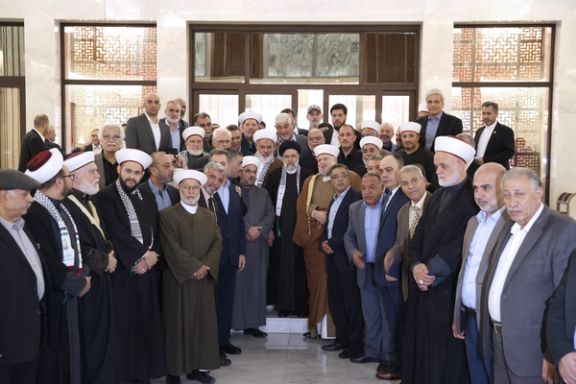
Iranian President Ebrahim Raisi Thursday met with anti-Israel groups during his two-day visit to Syria, Tehran's close ally, where he also signed several agreements.
According to reports by the Islamic Republic’s state media, Raisi and his Syrian counterpart Bashar al-Assad signed a “long-term strategic comprehensive cooperation” deal in addition to 14 other agreements in various areas, including trade, oil and energy, engineering, housing, rail and aerial transportation.
Heading a high-ranking politico-economic delegation, Raisi arrived in Damascus on Wednesday. The visit was the first by an Iranian president since the civil war broke out in Syria in 2011.
On the second day of his visit, Raisi held a meeting with representatives of militia groups fighting against Israel from Syria. These groups, which enjoy huge financial and military support from Tehran, are often called the “resistance axis” in the jargon of the Islamic Republic.
Most of these groups have representative offices in Syria.
During the meeting with the leaders and commanders of the militant groups, Raisi reiterated Tehran’s claim about the future of the region, saying that Israel’s elimination may happen very soon as signs of its decline are visible, and described “resistance” as the only way to counter “the occupying regime.”
“The Zionist regime also planned to divide Syria with the support of the United States and Western countries, as well as the fielding of terrorist groups created by the United States, but they did not succeed,” he said.
Raisi stressed the need for unity among these forces in order to expedite “the collapse of Israel, the liberation of the holy al-Quds, and the Palestinians’ sovereignty over their fate.” “Today, the initiative is in the hands of Palestinian fighters on the battlefield, not at negotiating tables. We believe that the demise of the Zionist regime is imminent as the signs of its decline are visible,” he said.
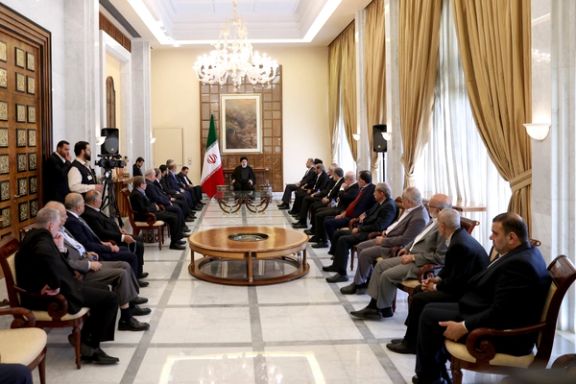
“The only solution for Palestine is state sovereignty based on the will of the Palestinians. If the Westerners seek democracy, they should acknowledge the Palestinian people’s vote and remain committed to it,” Raisi said.
On Wednesday, Raisi addressed a host of Syrian regime loyalists and officials at a Shia shrine, saying, “The policy of the Islamic Republic of Iran is to support the oppressed and hence, it stands beside the oppressed Palestinian nation as well as the resistance in Lebanon, Syria and elsewhere in the world."
Raisi had a large retinue during his visit to Syria asa majority of his cabinet was accompanying him.
Mehrdad Bazrpash, the Iranian road minister and head of the Iran-Syria Joint Economic Commission described the signed documents as “nearly unprecedented both in terms of number and importance of issues.”“A major part of these documents seeks to facilitate trade between the two countries,” he told IRIB after the signing ceremony, noting that the agreements will improve the quality and volume of bilateral trade.
Tehran and Damascus apparently also discussed the establishment of a joint bank and joint insurance company that will ease trade, said the official.
According to one of the agreements, 50,000 Iranians will be able to make pilgrimage to the shrine of Hazrat Zainab, the granddaughter of the Prophet Muhammad, in Damascus on a yearly basis, using three to five direct flights every week, Bazrpash said. He added that the operation to dispatch pilgrims will start in the next two months.
Israel has vowed to prevent Iran's entrenchment in Syria. Israeli strikes in recent weeks have seen key Iranian military figures killed from the Revolutionary Guards and the Quds Force. Israel has been regularly targeting Iranian weapons depots and shipments in Syria.